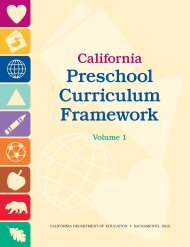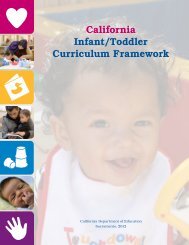Infant Toddler Learning & Development Foundations
Infant Toddler Learning & Development Foundations
Infant Toddler Learning & Development Foundations
Create successful ePaper yourself
Turn your PDF publications into a flip-book with our unique Google optimized e-Paper software.
xii<br />
• Problem Solving: The child’s developing<br />
ability to engage in a purposeful<br />
effort to reach a goal or to<br />
determine how something works<br />
• Imitation: The child’s developing<br />
capacity to mirror, repeat, and<br />
practice the actions of others,<br />
either immediately or at a later<br />
time<br />
• Memory: The child’s developing<br />
ability to store and later retrieve<br />
information.<br />
• Number Sense: The child’s developing<br />
understanding of number<br />
or quantity<br />
• Classification: The child’s developing<br />
ability to group, sort, categorize,<br />
and form expectations<br />
based on the attributes of objects<br />
and people<br />
• Symbolic Play: The child’s developing<br />
ability to use actions,<br />
objects, or ideas to represent<br />
other actions, objects, or ideas<br />
• Attention Maintenance: The<br />
child’s developing ability to<br />
attend to people and things while<br />
interacting with others or exploring<br />
the environment and play<br />
materials<br />
• Understanding of Personal Care<br />
Routines: The child’s developing<br />
ability to understand personal<br />
care routines and participate in<br />
them<br />
As the above list suggests, the foundations<br />
for the cognitive development<br />
domain cover a broad range of knowledge<br />
and skills. For infants and toddlers,<br />
these various competencies are<br />
interwoven and develop together. As<br />
children move out of the birth-to-three<br />
period, some of the cognitive compe-<br />
tencies become differentiated and can<br />
be aligned with traditional preschool<br />
content domains such as mathematics<br />
and science. In effect, infants’ and toddlers’<br />
playful exploration and experimentation<br />
in the cognitive domain<br />
represent an early manifestation of<br />
mathematical and scientific reasoning<br />
and problem solving.<br />
Perceptual and Motor <strong>Development</strong><br />
Domain. <strong>Infant</strong>s’ and toddlers’<br />
perceptual and motor competencies<br />
are receiving increasing attention in<br />
research and practice. The perceptual<br />
and motor development foundations<br />
are defined as follows:<br />
• Perceptual <strong>Development</strong>: The<br />
child’s developing ability to<br />
become aware of the immediate<br />
social and physical environments<br />
through the senses<br />
• Gross Motor: The child’s developing<br />
ability to move and coordinate<br />
large muscles<br />
• Fine Motor: The child’s developing<br />
ability to move and coordinate<br />
small muscles<br />
<strong>Infant</strong>/toddler programs can foster<br />
children’s perceptual and motor learning<br />
and development through environments<br />
that offer safe and appropriate<br />
physical challenges.<br />
Organization of the<br />
<strong>Foundations</strong><br />
The publication begins with a<br />
chapter that focuses on the first four<br />
months of life. Separate foundations<br />
in each domain were not written for<br />
the first four months because every<br />
aspect of early development relates to<br />
all domains simultaneously. Although<br />
development during the first four<br />
months is undifferentiated, it has a
















